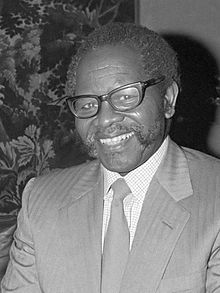
Operation Vula (also known as Operation Vulindlela, Xhosa for Open the Road)[1][2] was a secret domestic programme of the African National Congress (ANC) during the final years of apartheid in South Africa. Initiated in 1986 at the ANC headquarters in Lusaka and launched in South Africa in 1988, its operatives infiltrated weapons and banned ANC leaders into the country, in order to establish an underground network linking domestic activist structures with the ANC in exile. It was responsible for facilitating the only direct line of communication between ANC headquarters and Nelson Mandela, who at the time was imprisoned and was discussing a negotiated settlement with the government on the ANC's behalf.[3] The operation was disbanded in 1990, after its existence had been publicly revealed and eight of its leaders charged under the Internal Security Act with terrorism and plotting an armed insurrection.
Operation Vula was approved by the ANC National Executive Committee but thereafter proceeded on a strictly need-to-know basis, with many ANC members unaware of its existence and many ANC leaders unaware of the details of its activities. It was commanded by Mac Maharaj and Siphiwe Nyanda, whom ANC President Oliver Tambo congratulated in 1988 on not only "the immense potential of the Vula concept but also its tremendous yield in terms of what has been achieved within a short period of time."[4] Commentators have admired the sophistication of the operation,[2][4][5] and historian Stephen Ellis calls it "the most effective and impressive project ever mounted by the ANC."[6] However, Ellis also notes that Vula arrived "too late to have a major effect on the strategic balance" in the negotiations to end apartheid.[6]
- ^ Jordan, Pallo (2004). "The African National Congress: From Illegality to the Corridors of Power". Review of African Political Economy. 31 (100): 203–212. doi:10.1080/0305624042000262248. hdl:10.1080/0305624042000262248. ISSN 0305-6244. JSTOR 4006887. S2CID 153416768.
- ^ a b Henderson, Robert D. (1 December 1997). "Operation Vula against apartheid". International Journal of Intelligence and CounterIntelligence. 10 (4): 418–455. doi:10.1080/08850609708435358. ISSN 0885-0607.
- ^ O'Malley, Padraig (1 April 2008). Shades of Difference: Mac Maharaj and the Struggle for South Africa. Penguin. ISBN 978-0-14-023224-0.
- ^ a b "How Operation Vula Became an Underground within ANC". Sunday Independent. 29 April 2007. Archived from the original on 26 December 2021. Retrieved 26 December 2021.
- ^ Williams, Rocky (2000). "The other armies: A brief historical overview of Umkhonto We Sizwe (MK), 1961-1994". Military History Journal. 11 (5). Archived from the original on 5 April 2023.
- ^ a b Ellis, Stephen (2013). External Mission: The ANC in Exile, 1960-1990. Oxford University Press. ISBN 978-0-19-933061-4.